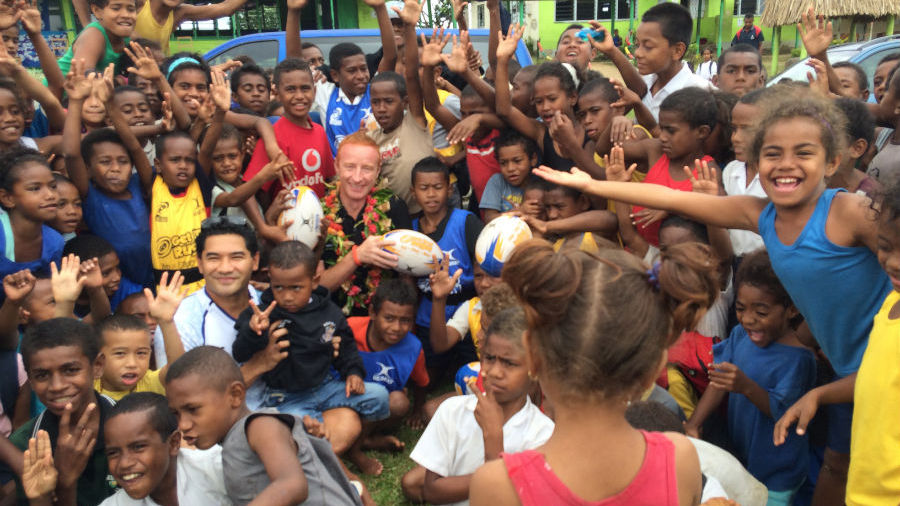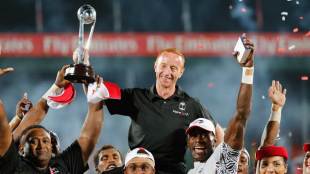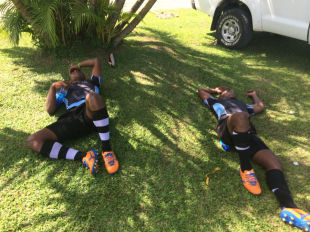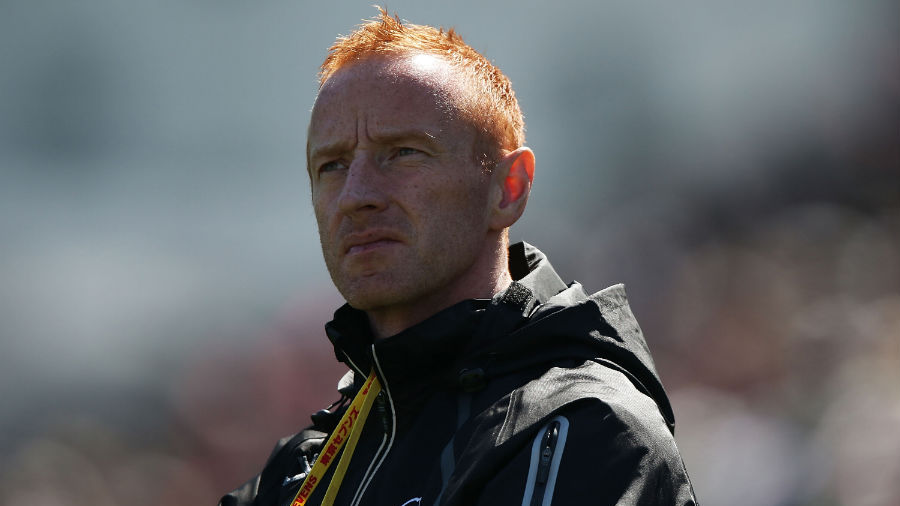|
ESPN talks to Ben Ryan
Paradise Lost
Tom Hamilton
August 7, 2014

On a visit to a local school © Ben Ryan
Enlarge
Life in Fiji for Sevens coach Ben Ryan sounds idyllic. He lives just an hour away from Suva near Navua on the south coast and when he wakes up in the morning, his bedroom windows look out on the Pacific Ocean. His daily routine sees him rise an hour or two before the sun so he can have make the most of two hours of the British working day. Then he could be visiting players or clubs, involved in competitions or journeying to the Fijian Rugby Union's (FRU) offices in Suva. On the way back from work he will stop by a stall on the side of the road, pick up fresh fish and vegetables as he returns to his Coral Coast retreat. He consumes the coconuts which drop in his garden and he has even become accustomed to the Fijian climate - the blanket comes out when the temperature drops to the mid-60s. On the pitch, Fiji have done well. They scored more points than anybody else in the IRB Sevens World Series, more tries, had the top try-scorer in Samisoni Viriviri and handed New Zealand their biggest defeat in the history of the sport. Viriviri was also named IRB Sevens Player of the Year. But success for Fiji in Sevens is a double-edged sword. Success inevitably means the profile of players growing, offers increasing and departures. Away from the tranquil surroundings of Ryan's retreat comes hardship, frustration and an ever-increasing battle to secure the best for his players and their families as well as the team. The cloud of financial uncertainty is a permanent fixture. 
The view from Ryan Manor
© Ben Ryan
Enlarge
It was September 20, 2013, when Ryan took up the post as Fijian Sevens head coach, 47 days after he left his job in charge of England. During his time with England a professional infrastructure was brought in for the game and central contracts offered. The players could expect the best facilities possible and competitive wages. When Ryan arrived in Fiji a few days before the Gold Coast Sevens, it could not have been more different from what he was used to in leafy Middlesex. "I came in and the team was already picked for the Gold Coast and they were unfit," Ryan told ESPN. "We made a lot of changes after the Gold Coast tournament and we gained momentum by winning Dubai. It was the hardest financial period in Fiji's rugby history and we did not have any money. "We weren't able to train adequately. We didn't have any kit, we didn't have any bottled water, we weren't able to book places to stay at because we didn't have the money. Petrol ran out on the bus on the way to training as we couldn't afford petrol. I put my hand in the pocket as much as I could but there was a point when the programme just wasn't working. "The IRB had stopped their funding and we didn't have a sponsor and the sponsored money was paying off the debts. That makes you think on your feet - you have to make the most out of your time with the boys. The players never complained but we did lose some of them. When I came in we lost some and the same thing happened at the end of this season but not the same numbers as we lost last season." Ryan references reports that came to light back in January that he was yet to be paid by the FRU. "People found out about what happened with me about my salary," he said. "When I made the decision to come across and I knew they wouldn't have any money when I first arrived. Had they paid me, there wouldn't have been anything to pay those in the offices so I accepted that was what had to be done. Unfortunately someone on the board said something to the press and that was that. The government stepped in and started paying me, which means it doesn't affect the FRU's funding."
The lack of funding has inevitable knock on effects. Ryan is quick to praise the role of the IRB in helping out the Islands but private sponsorship is needed so that any money which comes in does not cover the FRU's debts but is paid to the players. Central contracts will be brought in for the 2014-15 season, but the money on offer pales compared to what is on offer in Europe, Japan and Oceania. The close season has seen four of Fiji's Sevens players depart for pastures new. Viriviri has been signed by Montpellier, Benito Masilevu - their second top try-scorer - will go to Brive, Levani Botia to La Rochelle and another to a fourth division French club. "That shows the power of the euro," Ryan said in reference to the last case. "He's gone to an amateur league and that's not going to advance his career unless he's spotted by one of the big clubs." The recruitment pool is there for Fiji; Sevens is, after all, the number one sport in the country, but it is fiercely difficult to keep promising youngsters in the country. Half of the victorious Fijian schoolboy side who beat New Zealand in September 2013 are already abroad. The previous pattern used to see Fijians establish themselves in Sevens then take up a big-money offer from abroad but continue to play for the national side at XVs level. However, the increasing numbers of schoolboys taking up scholarships elsewhere represents the new the trend. "I've seen schools coming across to Fiji with money to spend and they spend it on anything from one to five players depending on how they can cut their money up," Ryan said. "They then become part of the system. I can see there are good opportunities sometimes and I can understand why players migrate. I'd never criticise a player for disappearing to help their family financially but it does get under your skin." The Brive academy established earlier this year on the island is an unwelcome distraction for Ryan. He has misgivings over the ethics of such a venture and wants more due diligence in the future to help prevent such establishments being set up. 
Winning the Dubai Sevens
© Getty Images
Enlarge
He also feels more must be done to help players deal with the situation when clubs want their services. At present there are 125 Fijians playing professional rugby in France and, in Ryan's opinion, half are being underpaid. The Pacific Islands' Players' Association helps but they too are hamstrung by a lack of funding. "They have got people like Deacon Manu working there and they are good guys," Ryan said. "They need more funding and support so they can help the players. They are so humble and obliging and they get offered low contracts but are too accepting and too nice and they also don't have the muscle behind them to get better deals. "I try and fight their corner and help the boys I coach. I help give them advice. There was one player who had a French club come to sign him at the one of the tournaments. The official who came didn't speak any English and gave him four contracts which were all in French. Contracts are hard enough, let alone in French, but the player was just told to sign it. The player knocked on my door and asked me to help him out. That's not what should happen, you can't expect a player to sign a contract that's all in French without help." Despite some unsavoury incidents, it's not all clandestine dealing. "I'm sure there is good practise. The general manager at Racing Metro Simon Raiwalui is an incredibly bright guy and helps the Fijian Rugby Union in making it a better process."
The pattern of rugby will not change. There will always be those clubs who can offer more than others and there are two signs of "light at the end of the tunnel" for Ryan. One is the money on offer near to the Island which impinges on their Sevens programme but allows the players to stay nearby. "A number of the conversations I've had with these chaps, you find they don't want to leave Fiji or the Islands. They love it here but the lure of the euro is so great. The top 40 Sevens players aren't here in the country at the moment as most are playing in Sri Lanka in a tournament which pays USA$400 (£237) or $500 (£296) a day, which is almost a year's salary in two weeks. You can't criticise them and it does get in the way of our pre-season programme but I'm not going to stop them." The other hope for Ryan is the possibility of the 18th Super Rugby franchise for the 2016 season being awarded to Singapore, with the backers saying they will use it as a place for Islanders to play top-level rugby. "I hope the new Super Rugby franchise will be the one from Singapore as that would provide huge solutions. That would be a credible alternative to France and would work well with our Sevens season. It's the light at the end of the tunnel." So what's the immediate answer to the player drain? Briefly, there is no short-term fix, though central contracts will help. Ryan still hopes, somewhat tongue-in-cheek, for a millionaire philanthropist to invest in Fijian rugby. Other than that he will continue to fight his team's cause and waits with interest to see how the country might benefit from the IRB loophole concerning nationality changes in time for the Olympics. 
Sheer exhaustion after training
© Ben Ryan
Enlarge
Players like Sitiveni Sivivatu and Joe Rokocoko have been suggested as potential players who may choose to swap allegiance to Fiji having fulfilled the relevant criteria (they must hold a valid passport and have not played for another nation in the past 18 months - they must then feature in a Sevens World Series event next year which will allow them to play in the 2015 RWC if picked). Ryan says the Sevens will do all they can to help the XVs in preparation for the 2015 Rugby World Cup as it is for the "greater good". But such is the embarrassment of riches at Fiji XV's coach John McKee's disposal, someone who Ryan is in contact with every day, there are no guarantees Sivivatu or Rokocoko would be able to force their way into contention. A quick look at the players available shows an overflow of talent: Niki Goneva, Napolioni Nalaga, Watisoni Votu, Waisea Nayacalevu, and Timoci Nagusa. That is the beauty of Fijian rugby. The dual-nationality conundrum is something Ryan and McKee will approach in the near-future but for the coming days, it will be business as usual for Ryan. He will continue his commute from his home near Navua and will persevere in planning for the 2014-15 season. "I'm off next week to Vanua Levu and I need to get a five-hour ferry followed by a gravel road for two hours to get to a tournament, but it's where William Ryder and Serevi come from. I have the income which allows me to get across to these places, to visit the guys who may never get a chance to impress or come to the island. They sometimes just stay in their village on the smaller islands. It was one of my priorities to get to these places and see the talent we've got." In two years and a day Ryan will probably finish with Fiji. He hopes it will be marked with a gold medal at the 2016 Olympics. He won't have the same luxury as the Kiwis, who have reportedly set aside NZ$2m (£1m) to help their cause and persuade some of the world's top players to play in the tournament. Ryan's side, in whatever form it takes, will give it one almighty go. "I don't have any regrets," he said. "I have improved as a coach and I have a different set of rules, budgets and philosophies to follow. It is a national sport in Fiji and everyone knows you and who plays for your team. Everyone stops to watch the games live. I can't think of any other nations where that happens, apart from for the All Blacks maybe, but not in Sevens. There are supremely talented individual players in the Islands and rugby was made for Pacific Islanders." 
© Getty Images
Enlarge
© ESPN Sports Media Ltd Tom Hamilton is the Associate Editor of ESPNscrum.
| ||||||||||||||||||||||||||||||
Live Sports
Communication error please reload the page.
-
Football
-
Cricket
-
Rugby
-
- Days
- Hrs
- Mins
- Secs
F1 - Abu Dhabi GP
Abu Dhabi Grand Prix December 11-131. Max Verstappen ()
2. Valtteri Bottas (Mercedes)
3. Lewis Hamilton (Mercedes)
4. Alexander Albon ()
5. Lando Norris ()
6. Carlos Sainz Jr ()
-
ESPNOtherLive >>
Golf - Houston Open
Snooker - China Open
Tennis - Miami Open

